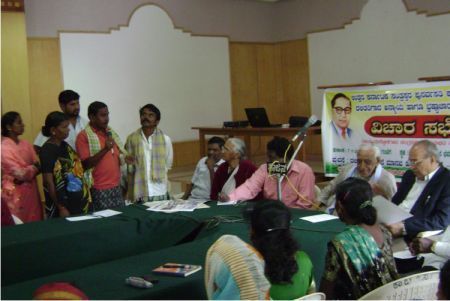
Public meeting – injustice to Dalits in the relief and rehabilitation efforts of the Government in the flood affected regions of North Karnataka
Venue: Legislators Hall, Bangalore
Date: Nov. 7, 2009
----------------------------------------------------------------------------------------------------------------------------------------------------
Human Rights for Forum for Dalit Liberation – Karnataka organised a public interaction
with the survivors of the recent floods in North Karnataka. Bijapur, Koppal, Gulbarga,
Raichur and Bellary districts were represented. The meeting primarily focussed on the
injustice and discrimination meted out to the Dalits in access to aid and rehabilitation
post the floods.
The meeting was presided over by State Convenor HRFDL-K, Basavaraj Kowtal. The Chief
dignitaries were Justice A J Sadashiva – SC/ST Commission Chairman, Dr. Dwaraknath
Chairperson Minority Commission, Shri Doriasamy Freedom Fighter, Ms. B T Lalita Naik,
Ex Minister and Women leader, Shri Bhupati, lawyers Forum for Social Justice and Shri
Shiv Sunder, writer and activist.
During the course of the meeting, the Dalit survivors shared their first hand account of
the discrimination that they faced in the rehabilitation provided by Government.
Durgamma from Haranahalli, Hospet Taluka, Bellary District whose house was destroyed
in the flood, shared they was given Rs. 5000 as compensation, whereas the upper caste
community received Rs.30,000 each. Apparently, all houses ruined were mud houses.
Along with her, people from same district also shared the discrimination in the
compensation for crop loss
Ramesh from Bijapur shared about the mass scale devastation from Indi and Sindhagi
taluks. 500 houses from a declared slum in Bijapur town was razed to the ground by bull
dozers and the people already suffering from the floods were put into further misery. He
shared personal accounts of incidents where the dalits were sent back from the Ganji
Kendra’s and asked to come back with their own plates. The Ganji Kendra’s are now not
even providing one basic meal to the families. The most disturbing account was of the
way in which Dalits were not allowed to take refuge in the temples and schools when the
flood waters were rising to dangerous levels. Situation as of now is that the Dalits are left
without houses, food and basic services. Ramesh further stated, the compensation
coming in was also namesake. There is no proper record of criteria for assessment and
compensation. People were provided with small chits of paper which they need to present
in the bank to receive the money. In addition, the banks refused to encash the cheques
and were asked to pay Rs.150 to open the bank account.
Children have been the most affected. The Government promised to provide books and
education support to the children within a week, but until now, nothing has reached
them. Children have already lost out on one month of schooling. With the approaching
winter, the families are in need of warm clothes.
Narsappa from Hulgunchi village, Sindhanur Taluk, Raichur District shared about the way
in which the implementation is totally shabby and insensitive. The District administration
insists on using old records dating as old as 1992 for rehabilitation. For example, the
current survey reveals that there are 85 dalit families residing in the village, but the
district administration is going by the old record which shows only 46 dalit families. He
also shared another disturbing issue about the impact of rehabilitation being given to the
religious heads, like the matha’s. He shared that the Ram Krishna swamiji has decided to
adopt Hulgunchi and now wants to change the village name to Ram Krishna Nagar. He
also insists that the people deposit their compensation money into his bank account, to
which he would add more money and reconstruct the houses.
The panel members towards the end of the meeting, which the time is now for action and
not only talks. They emphasized that it is not really a gap of information, but lack of
proactive efforts from the Government.
The key resolutions adopted from this meeting include:
1. Urging the State Government, District administration and Disaster management
authority to monitor effectively the relief and rehabilitation to affected Dalit
families.
2. The different Dalit vedikes and human rights organisations, media and individuals
will tour the affected districts and hold discussions with district administration of
identified cases of discrimination.
3. The cases will be documented and shared to the public.
4. To file cases under SC/ST Act against officials and others’ discriminative and
casteist attitude and practices towards dalit communities.
5. Rehabilitation programme should be implemented by the state machineries and
should not be sub-contracted to private agencies particularly religious groups.
6. Order of re survey in villages where dalits have been left out from the lists eligible
to receive aid and compensation.
7. Text books, school bags and uniforms should be immediately provided to children
affected by floods.
8. All schools and anganwadi’s should be well equipped and functional. Regular
health check ups should be conducted.
/articles/meeting-injustice-dalits-relief-and-rehabilitation-proceedings